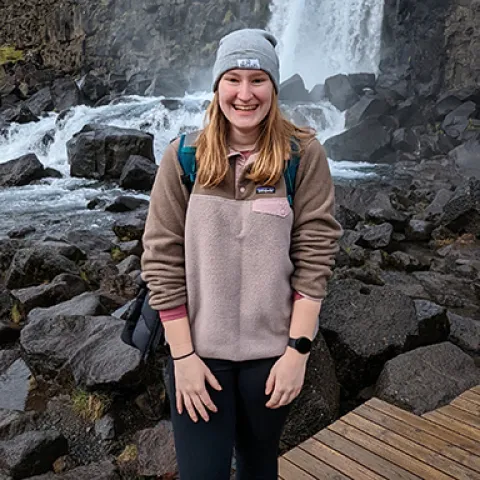
Meghan Hanks ’23
Meghan Hanks ’23 is a current UNE student with an environmental science major and a minor in art. Meghan was originally drawn to UNE while touring with her brother. The close-knit, supportive community, the river-side location and the environmental science program sold her.
The first taste Meghan had of UNE’s community integration was in a pottery class where they created bowls to be part of a fundraising event in the community. The pottery students volunteered to fill their bowls with soup and then the event attendees could keep the ceramic bowls after eating. Meghan says, “I thought that was a really interesting way to mix a class with a community project. I hadn’t been in a class before where we were able to do something like that.”
As part of a travel course offered at UNE, Meghan had the opportunity to travel to Iceland. The experience of learning about the geology and culture of a place, and then going to see it, was a great opportunity for Meghan to go outside her comfort zone. She says, “I’m an introvert so, I don’t tend to put myself out there very often. I’d like to work on that personally by getting involved in more travelling adventures. It was one of the best experiences I’ve ever had.”
This past summer, Meghan got involved with research through the Summer Undergraduate Research Experience (SURE). The SURE program allows a select group of students to have a paid position in a research lab to work on a specific project over the summer. After the summer, students present their findings at a fall research symposium during Homecoming. Meghan’s project is analyzing the relationship between fungal and bacterial communities in the soil and the surrounding oak trees. Working for a research lab over the summer allowed Meghan to test out a potential future job and develop important technical skills. She says, “I’ve been spending most of my days going out into the field and collecting samples. However, it’s important to be flexible because the project doesn’t always go in a straight line like you expect.” This experience has allowed Meghan to learn how to adapt when facing obstacles, conduct fieldwork, and analyze genetic data in a lab.
Research like the kind Meghan is doing is really important for understanding how our environment is affected by climate change. According to Meghan, there has been a lot of research done showing that fungus has helped trees become more drought resistant. However, climate change may alter that. Meghan says, “By having climate change come and completely disrupt the way these interactions work, it’s important to research what’s happening out there right now. We are trying to make this a long-term monitoring project to document how the forest is changing.”
The donations and funding that make paid research programs like this possible for UNE undergraduates are helping to push the student’s lives and this important research forward. Meghan says, “This has been an incredible experience for me. I have learned so much about what I want to do and where I’m going in the future because of this opportunity. If the SURE program had been an unpaid internship, I may not have been able to pursue this fantastic opportunity.”